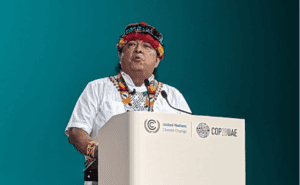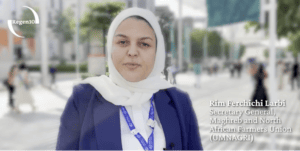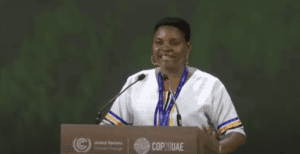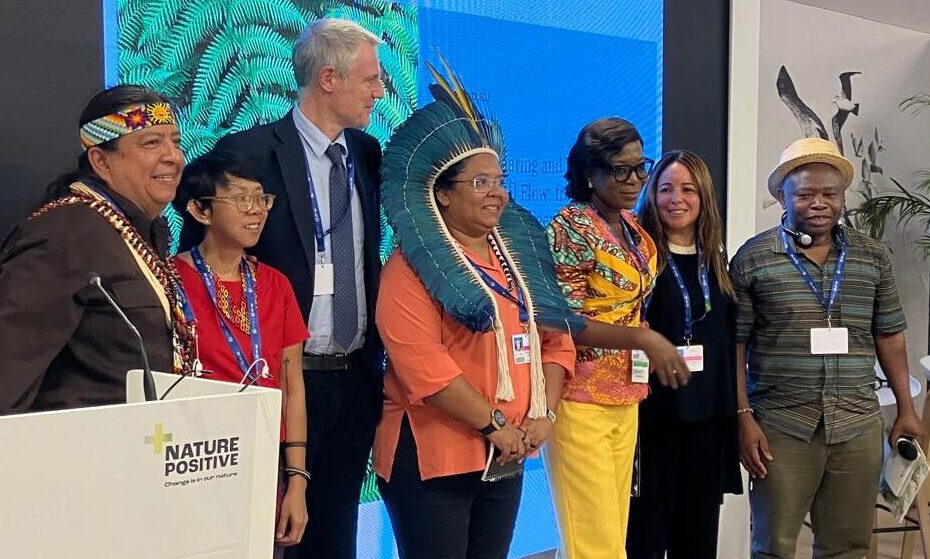A Seat at the Table: Meridian’s Frontline Community Delegation
9 December 2024
A just transition of our global food systems for future generations means creating positive change that benefits people, nature, and climate, centered around the voices of those who are most vulnerable, knowledgeable, and who produce the food that nourishes our world. This urgency was recognized by Meridian team members in 2022, and that year, we set out to form the Frontline Community Delegation. Together, this dedicated group of global family farmers, Indigenous Peoples, women, youth, and local community leaders work at the frontlines of climate action and food systems transformation.
In 2023, 45 Delegation members attended COP28 with participants from South and Southeast Asia, Asia Pacific, Sub-Saharan Africa, North Africa and the Middle East, and Latin America. Members spoke at public side events, conferences, took interviews, and formed new partnerships to support their work.
As a result of their participation, the Delegation achieved the following to help advance their goals and increase awareness of the critical need for a transformation of food systems across worldwide communities:
- Empowerment of marginalized voices in key forums
Family farmers and Indigenous leaders took the stage in multiple high-level events, participated in panels, and engaged other attendees directly to share their priorities. Through these efforts, Delegation members were able to reach new audiences they wouldn’t have been able to reach otherwise, including government officials, philanthropic organizations, corporate businesses, and civil society leadership.

- Increased cohesion in messaging and priorities
Outside of events and forums, Meridian facilitated multiple opportunities for members to meet with other conference attendees and develop common narratives. The Delegation also caught attention from the media, with outlets across various countries and languages publishing over 55 articles focused on issues raised by members. Many Delegation members proactively contacted their own government officials present at the conference, as well, to share their programs and engage in direct conversation. Being physically present at COP helped facilitate more opportunities on the ground, providing members with a greater sense of legitimacy in climate discussions.

- Broader representation of women and younger generations
Of the Delegation members who presented at COP28, 58% (22) identified themselves as women and 34% (13) identified as youth. These leaders ensured that the gender and youth dimensions of transforming food and agriculture and climate action were present and brought to the negotiating table to effectively address multidimensional climate challenges from their perspectives.

- Wide-reaching and enduring sense of community
Members of the Delegation are still connected today and regularly share their priorities with others, both locally and globally. Some of their current critical discussion topics include how to access climate financing and long-term funding for local efforts, finding new ways to participate in decision-making spaces, and how to create capacity-building opportunities that amplify advocacy efforts, resilience-related services, and internal organization development.
Looking ahead, next steps are already underway for the future of the Frontline Community Delegation. This involves raising funds to share their messages at the Rio Conventions and to influence narratives for COP30.
In the words of two Delegation members from Brazil and Argentina, Pablo Frere and Luiz Vicente Facco: “The fact that we can align on the key priorities across regions, languages, farming [practices], and Indigenous communities and push for common goals as a group is encouraging. It gets us closer to realizing change. We just need to be heard.”
Learn more about the mission of the Delegation and the voices of its members.
The Frontline Community Delegation was made possible through our partnerships with Alianza Mesoamericana de Pueblos y Bosques (AMPB), Global Alliance of Territorial Communities (GATC), Redes Chaco, the World Farmers Organization (WFO), and the World Rural Forum (WRF).
Additionally, this meaningful work could not be fulfilled without funding support from ClimateWorks Foundation for COP27 and The Robertson Foundation for COP28.

Case Study: Frontline Community Delegation
Learn more about Meridian's Frontline Community Delegation.